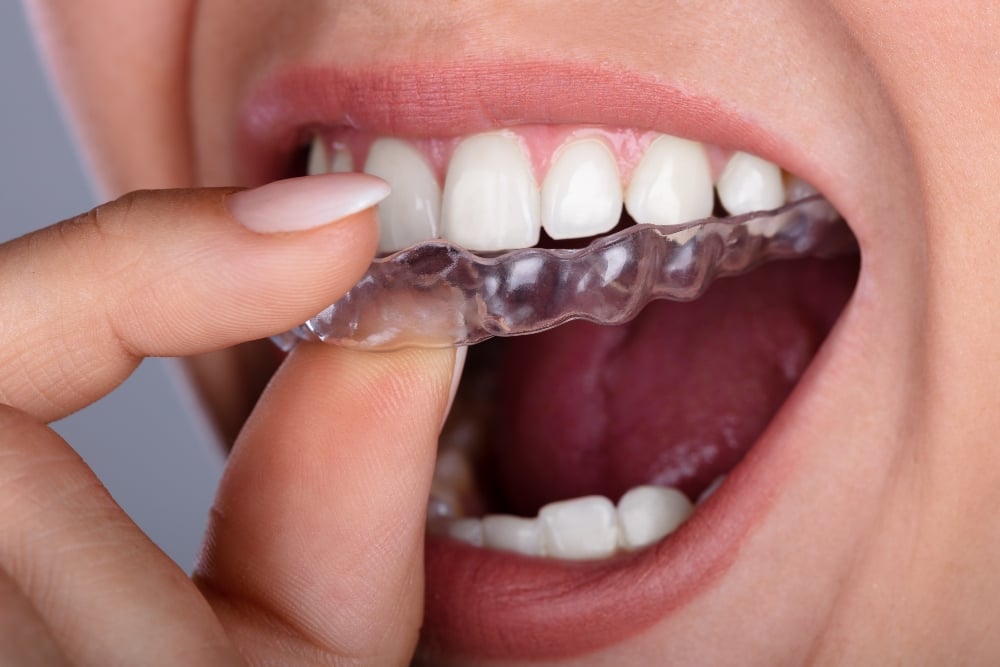Posted by Kenneth C. Thomalla, CPA, CFP®, CLU® on May 24, 2021 9:00:00 AM
Bruxism, or chronic teeth grinding, has increased significantly1 since the COVID-19 pandemic began in 2020. There are likely a number of reasons for the increase, but the most significant one is stress1.
It's important for dentists to make sure they understand the seriousness of this issue, what may be causing it, and how they can help their patients more fully to avoid the destruction of their teeth and other types of damage that come from teeth grinding.
Fortunately, there are ways to reduce the damage that bruxism creates. There may also be ways to treat the cause, depending on the specifics of the issue. By handling chronic teeth grinding issues quickly and finding an appropriate course of treatment for the individual patient, dentists will be more likely to prevent serious oral health issues in the people who come to them for help. Bruxism can lead to additional problems with the jaw, as well, so treating it properly may be more important for better oral health.

What Causes Bruxism?
While there are multiple causes of bruxism, teeth grinding and jaw clenching, stress and anxiety is thought to be the most significant issue. People who are chronically stressed or who suffer from anxiety disorders have bruxism at higher rates than the rest of the population. But now that the pandemic has been around for a year and will still be part of life for at least a while longer, the bruxism rates are going up and up in the general population. This could be coming from increased, overall levels of stress due to COVID-related worries.
When people have bruxism, they grind their teeth and clench their jaws. Sometimes they do this almost unknowingly, and they often also do it in their sleep. The teeth grinding may not be something they're aware of, because it's such a habit or because it's occurring when they aren't awake to realize it. Clenching their jaw during the day and ending up with pain or discomfort from that is another common issue that comes along with bruxism, but fortunately, it's generally treatable by dental professionals.
How Is Bruxism Treated?
The main treatment for bruxism2 is to put a barrier between the top and bottom teeth so they can't be ground together. This is usually done in the form of a mouth guard or night guard. It's usually worn at night only, but some people do wear one during the day. If they're clenching their jaw all the time at work, for example, wearing a guard can make patients more aware of that and reduce the damage that's being caused.
Some dentists also recommend cognitive behavioural therapy2, but there are also dentists who don't feel this is the right choice or who say that it doesn't help. That may depend on the individual patient, as well. Someone who recently started having anxiety issues or extra stress in their life and also started experiencing bruxism may benefit from medications or other treatment for their anxiety. In other cases, the bruxism may not respond to that, especially if it's been going on for some time.
What Do the Statistics Say?
According to research into bruxism issues in 2020, there has been a 59% increase in this condition, overall. That may or may not all be attributed to the pandemic, but it certainly looks as though the stress and worries surrounding COVID have played a role. Chipped and cracked teeth, cavities, jaw problems, and other issues have all gone up in 2020. That could be both related to the stress of the pandemic and the lack of dental care for people who couldn't seek treatment with their dentists.
The 2020 numbers indicated a 53% increase1 in teeth that were chipped or cracked, primarily as a symptom of TMJ (temporomandibular joint disorder), and a 27% increase in caries1. There was also a 30% increase in periodontal disease1, as people struggled with depression and weren't able to get to their dentists as frequently as they did in the past. These issues can be treated now, but they could have likely been avoided if not for COVID.
What Kind of Harm Can Bruxism Cause?
Bruxism generally causes issues such as cracked and damaged teeth, cavities, jaw pain, a wearing away of tooth enamel, cavities, and an increased risk of periodontal disease. Not everyone who grinds their teeth or clenches their jaw will end up with these types of problems, and the issues are more severe in some people.
Getting good quality treatment to reduce pain and future problems is the goal for patients. With so many dentists shut down due to COVID, the increase in bruxism and its surrounding issues isn't entirely surprising.
Helping More Patients Is the Goal for Dentists
Keeping an eye on the bruxism spike is another way that your dental practice can serve more patients. That lets you work with patients who struggle with bruxism and other concerns so you can make their lives better. Addressing cavities, chipped or cracked teeth, and other types of problems before they get any worse is a good idea for any patients regardless of age or other oral health issues.
As the pandemic begins to ease and more dentists are able to see higher volumes of patients, it may be good to focus on an overall plan of care for the people who rely on you to help them with tooth, gum, and jaw problems such as bruxism and its related concerns. Seeing higher numbers of patients with bruxism will likely be common for the immediate future.
Learn more about growing your patient list with our free guide.
Sources
1) https://www.ada.org/en/publications/ada-news/2020-archive/september/hpi-poll-dentists-see-increase-in-patients-stress-related-oral-health-conditions
2)https://www.mayoclinic.org/diseases-conditions/bruxism/symptoms-causes/syc-20356095
Treloar & Heisel and Treloar & Heisel Property and Casualty are divisions of Treloar & Heisel, LLC.
Insurance products are offered through Treloar & Heisel, LLC.
This content is intended for general informational purposes only and should not be construed as advice. Treloar & Heisel, LLC. does not offer dental or medical advice.
21-070


